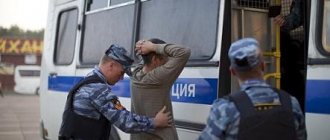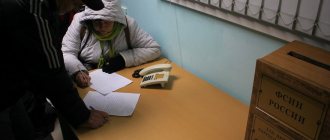Restriction of freedom is always stressful for the body. You can’t be prepared for this, because problems arise when you don’t expect them.
However, in most cases, the people themselves are to blame for this because they failed to block their desire to commit a crime. As a result, it transformed into a real restriction of freedom, which pretty much spoils the nerves.
In this article we will look at what restriction of freedom is under Art. 53 of the Criminal Code of the Russian Federation in 2022, how it differs from other similar crimes, who is assigned and for what, how to early release oneself from execution of punishment and a number of other issues related to this topic.
What is restriction of freedom
General provisions concerning the essence and features of restriction of freedom are regulated by Art. 53 of the Criminal Code of the Russian Federation.
Restriction of freedom is the imposition of certain mandatory restrictions on a convicted person, the observance of which is monitored by the Penal Inspectorate or the Penitentiary Inspectorate.
Under any circumstances it is prohibited:
- Change of place of residence or stay.
- Traveling outside the boundaries of the municipality.
It is obligatory to appear for registration at the inspection 1-4 times monthly . The number of appearances is determined by the court. In addition to the above, the offender may be subject to the following restrictions:
- at the time of day specified in the sentence, be where he lives permanently;
- refuse visits to places specified by the court that are located within the locality named in the verdict;
- not to attend or participate in mass or other events, all or specific, determined by the court, for example, rallies, children's institutions, competitions;
- do not change places of work or training.
Changing your place of residence, work, educational institution, not being at home at a specific time of day, leaving a municipality, or visiting the institutions specified in the verdict is possible only with the consent of the criminal-executive inspection.
Such consent is given in the event of exceptional personal circumstances. Their list and the procedure for obtaining consent are given in Article 50 of the Penal Code of the Russian Federation.
The establishment of other restrictions is not provided. Restriction of freedom acts as both a primary and an additional punishment; it is not applicable to:
- Members of the Armed Forces.
- Citizens of other states.
- People who do not have citizenship.
- People who do not have a place where they live permanently in the Russian Federation.
Conditions and limits of use
Let us thoroughly analyze these completely different types of punishment. For crimes of what gravity and for what period are they assigned, as well as the conditions of serving.
Deprivation of liberty
This punishment is imposed for crimes of any gravity only as the main one. The criminal law distinguishes between imprisonment for any period of time and lifelong imprisonment.
When convicted of a crime committed for the first time, classified as a minor crime, immediate deprivation of liberty is possible under the following conditions:
- The crime was committed under aggravating circumstances.
- The punishment under this article is only imprisonment.
Or for the following acts, regardless of these conditions:
- acquisition, transportation, production, processing, storage of drugs in a significant amount without the purpose of selling them under Part 1 of Art. 228;
- cultivation of drug-containing plants on a large scale under Part 1 of Art. 231;
- forgery or issuance of prescriptions for narcotic drugs committed illegally under Art. 233.
If deprivation of liberty is permissible under the article, its appointment is possible for any person only as the main punishment for crimes of any gravity.
The minimum duration of deprivation is 2 months , the maximum when assigned for one act is 20 years . When there is no lower limit, it is considered to be exactly 2 months.
For example, when the sanction of an article states “punishable by imprisonment for a term of up to 3 years,” it should be read that it can be lost for a period of 2 months. up to 3 years.
For aggregation of crimes , when a conviction is made for several acts of one person, the maximum duration is 25 years.
By cumulative sentences , when a person is convicted of a new unlawful act before the full sentence of a previously imposed sentence has been served, the maximum duration is 30 years.
For a number of particularly dangerous acts for society in situations clearly specified by law, one can be deprived of liberty for a maximum of 35 years or for life.
The term of punishment is calculated in months and years from detention. It can be executed conditionally.
Restriction of freedom
This punishment can be assigned as a main or additional punishment.
As the main punishment, restriction of freedom is applied for criminal acts of up to moderate severity and lasts from 2 months. up to 4 years .
As an additional measure , it is used with imprisonment or forced labor, if the article provides for this. Duration can range from six months to 2 years .
It is impossible to enforce a restriction of freedom conditionally.
It cannot be used:
- Military personnel.
- For foreigners.
- Persons who do not have citizenship.
- For those who do not have a permanent place of residence in Russia.
During his serving, the court obliges the convicted person:
- do not change the place where he lives or stays;
- do not leave the municipality.
- register with the inspection 1-4 times monthly.
Liabilities may also be imposed:
- Do not leave your home at the specified time of day.
- Do not go to the places specified by the court in the verdict. Their signs may be indicated, for example, in establishments selling alcoholic beverages.
- Do not participate in public events or go to them. The ban may apply to all such events, as well as those that, in the opinion of the court, do not contribute to its correction.
- Do not change places of work or study.
Setting other restrictions is not possible.
Actions such as changing the place of residence or work, traveling outside the locality, the convicted person will be able to carry out if he receives the consent of the supervisory authority - the penitentiary inspection or the penitentiary inspectorate. The list of situations in which this consent can be obtained is determined by law.
If the convicted person behaved in an exemplary manner , the Penitentiary Inspectorate has the right to initiate consideration by the court of the issue of partial lifting of the restrictions. If his behavior was not exemplary, the question of supplementing them is raised.
In case of malicious evasion of serving, it is possible to replace the unserved part of the sentence. For example, such a situation may arise if a convicted person refuses to use technical means of supervision, which include the well-known electronic bracelet.
Then every two days of restrictions on freedom will become one day of deprivation of freedom or forced labor.
The beginning of the countdown of the time of restriction of freedom when assigning the main punishment is the day of registration with the criminal executive inspection (CII).
If applied as an additional punishment, the countdown of the term begins from the day of release from the correctional institution.
Deadlines and their calculation
This punishment is applicable as the main one only for crimes of minor and medium gravity . It lasts from 2 months to 4 years .
The period begins to be calculated from the date when the convicted person is registered with the criminal-executive inspection. It includes the period during which he was held in custody before sentencing in the ratio of 1 day in custody for 2 restrictions on freedom.
As an additional punishment , it is imposed for a period of six months to 2 years , when such a possibility is provided for by the Criminal Code along with:
- forced labor;
- imprisonment.
In such a situation, the court decides to apply, for example, imprisonment with restriction of freedom. This means that upon completion of the prison sentence, the restriction of freedom must be served. The punishment is considered fulfilled in full after the additional punishment has been served.
The duration of restriction of freedom, which is an additional punishment, begins from the date of release after serving the main one. The time spent getting to your place of residence after release is included in the period of restriction of freedom.
It does not include the time when the convicted person is absent from his place of residence for more than a day without the permission of the penal inspection, without good reason.
Purposes of introducing a new criminal measure
Please note:
It is important to distinguish restriction from arrest (detention) and imprisonment (forced isolation from society). If in the first case the arrest is temporary, then deprivation of liberty is already a measure of criminal punishment.
The concept and conditions for the court to apply restriction of freedom as a criminal punishment are regulated by Art. 53 of the Criminal Code of the Russian Federation.
The objectives of introducing this measure:
- the ability to achieve the goals of punishment and correct the guilty person without completely depriving him of his freedom,
- reducing the burden on prisons when crimes of light and medium gravity are committed for the first time,
- implementation of the principle of humanity in the norms of modern criminal legislation of the Russian Federation.
Execution of restrictions on freedom
The convicted person serves it where he permanently resides. The Penitentiary Inspectorate (CII), serving the area in which the convicted person lives, no later than 15 days after receipt of the sentence, issues a notice obliging him to appear for registration.
The convicted person is given 3 days to attend the inspection. There he will be registered, his rights will be explained, what is allowed and what is not allowed when serving a sentence, the consequences of violations, fingerprinted and photographed.
At the end of the first conversation, the convict:
- signs that the necessary provisions of the law concerning the serving of his sentence have been explained to him;
- receives a memo;
- informed about the days of appearance at the Penitentiary Inspectorate.
If restriction of freedom is applied as an additional punishment, the convicted person, having been released after serving the main sentence, is sent to the place where he permanently resides. Correctional officers issue him an order specifying the time when he needs to arrive at the penal inspection.
Within 3 days from the registration of the convicted person, the inspectorate notifies:
- the police department at his place of residence;
- court;
- military commissariat, if he is subject to conscription.
Procedure for execution of punishments
Execution of punishment in the form of restriction of freedom has its own characteristics . After the trial, a copy of the verdict is sent to the executive inspection.
Its employees, in turn, send an official notification to the convicted person with a requirement to come to the specified address and register (the office number for marks is also indicated in the appeal).
They have no more than 15 days to do this, and the person who committed the crime has no more than 3 days after receiving it . You must have an identification document with you.
Upon arrival at the inspectorate, its employees will tell you about the procedure for serving the sentence and conditions, rights and obligations, responsibility for violations, take fingerprints and take a photograph. To get into the office, you will have to wait in line (probability – 90%).
Consequences of exemplary behavior and violations
The law rewards those who strictly fulfill their obligations.
If the behavior of a person serving a sentence was exemplary and there were no complaints against him, the penal inspection, in accordance with the established procedure, can apply to the court to cancel some of the restrictions he has.
Incentive measures may be applied to such persons. Among them, for example, is the opportunity to spend weekends, holidays, and vacations outside the municipality, which is prohibited from leaving.
If violations were committed and sanctions were applied for them, the criminal-executive inspection has the right to go to court to supplement the assigned restrictions.
Violations are considered cases when the convicted:
- Didn’t come to the UII to register.
- Does not comply with restrictions.
- Didn't show up when called.
- Didn't arrive for registration.
- He violated public order, for which he incurred administrative liability.
- He did not notify the correctional institution about the change of job or place of study 7 days before, when the court did not indicate such an obligation in the verdict.
In this case, a warning is applied for the first violation . If there is a repeated violation within a year from the date of warning, an official warning about the inadmissibility of violations is announced.
If the convicted person maliciously evaded restriction of freedom, which is the main punishment, its unfulfilled part may be replaced by the court in the ratio of 2 days of restriction of freedom per 1 day of deprivation of freedom or forced labor.
Evasion will be malicious if the convicted person:
- Within a year after the warning, he will commit a new violation.
- Will refuse those. means of supervision and control.
- He will hide, that is, for 30 days it will not be known where he is.
- Will not arrive at the inspectorate for registration after serving the main sentence.
For malicious evasion of restriction of freedom, applied as an additional punishment , you will have to answer under the first part of Article 314 of the Criminal Code of the Russian Federation and it may entail :
- up to a year of forced labor;
- up to a year in prison.
Powers of the criminal-executive inspection
The supervision of the correctional institute over those sentenced to restriction of freedom consists of observing how they behave, whether they comply with the restrictions, and taking measures in case of violations.
In order to collect information about how the convicted person behaves, technical means, for example, the well-known electronic bracelet, can be used. The list of these devices is established by the Government of the Russian Federation, and the procedure for use is established by the Ministry of Justice.
The educational institutions conduct educational work, in which members of the public can be involved.
To ensure proper supervision, inspection staff:
- The convicted person is summoned for interviews at least once a month.
- Once a month, checks are carried out at home, at the workplace, and at an educational organization.
- They visit the place where the convicted person permanently lives at any time, except at night. Additional checks by landline telephone are permitted.
- They collect information about how the convicted person behaves at home, at work or in the educational institution he attends.
- If a convicted person is limited in visiting specific places, they are checked at least once a month.
- Use enforcement measures in case of violations.
- Decide on the possibility and necessity of using technology. means of control.
Difference from imprisonment
The difference, of course, is that these are completely different types of punishment and they are different in everything:
- In essence . When deprived of liberty, a person is completely isolated from society. Restriction of freedom is expressed in the obligation to comply with certain restrictions while at home, periodically visiting the penal inspection.
- In severity . Restriction of freedom is a less severe punishment. As the main one, it is assigned for acts that do not pose a particular danger to society. For more dangerous acts, strict types may be added. Deprivation of liberty is applied for any crime if it is provided for by the norm of the Criminal Code of the Russian Federation exclusively as the main punishment.
- In how they are performed . The restriction of freedom is served at the place where the convicted person permanently resides; his behavior is monitored by the criminal-executive inspection. Imprisonment is served in special institutions, and the convicts are supervised by their employees.
In detail: How does restriction of freedom differ from imprisonment?
Some similar features of the above types of punishment can be seen in the case of suspended imprisonment, which is also served at the place of residence, with registration, performance of a number of duties, control by the correctional department, etc.
Did the article help you?
Not really
Prohibitions and responsibilities of a convicted citizen
The difference between restriction of freedom and deprivation of freedom lies in the range of duties and prohibitions applied to the convicted person.
Thus, with a restriction, the offender does not have the right to:
- leave the residential premises at the time determined by the court,
- travel outside the populated area,
- attend public events (rallies, pickets, etc.),
- come to the places of the locality determined by the court,
- change place of residence, study or work without permission from the supervisory authority.
Additionally, the convicted person is required to visit the government agency that carries out the functions of supervision over convicted citizens for the purpose of registration. The number of visits is determined by a court decision (varies from 1 to 4 times a month).
The Criminal Code of the Russian Federation provides for punishment in the form of house arrest. In fact, this is a preventive measure during the investigative investigation of the crime in which the arrested person is suspected. We will tell you more about the terms of house arrest and arrest houses in Russia in this article https://lexconsult.online/7846-domashnii-arest-arestnye-doma-v-rossii








